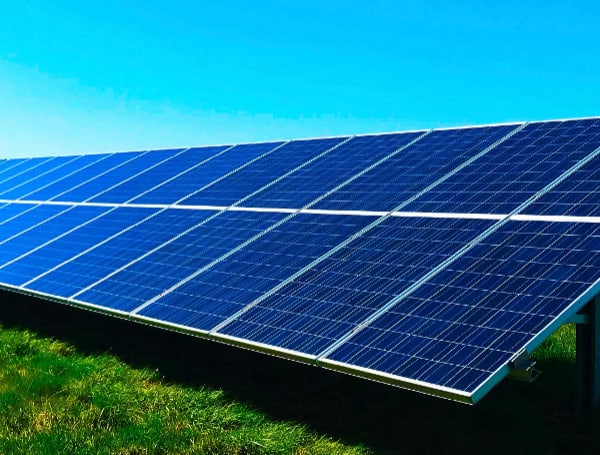President Joe Biden’s administration reimposed solar tariffs Thursday after waiving them for two years, which enabled Chinese companies to undercut American producers, according to industry and trade experts.
In June 2022, the administration suspended certain protective tariffs targeting cheap Chinese imports for a two-year period, which officially concluded Thursday.
The reimposition of the levies may be insufficient because Chinese producers had ample time to flood the American market and prepare to workaround possibly forthcoming measures, several solar industry and international trade experts have said.
Read: ACLU Unveils Plans To Obstruct Trump’s Immigration Agenda
“The damage has already been done. The administration left a backdoor open for foreign producers at a time when we should have been re-building domestic capacity,” Mamun Rashid, CEO of an American solar company called Auxin Solar, told the Daily Caller News Foundation. “Moreover, they provided a blueprint for future loopholes and gave foreign producers ample time to prepare to take advantage of those loopholes. Now, the foreign producers are fully prepared.”
“We will see the results in a year or two,” Rashid continued. “The irony in all this is industrial policy which the administration worked hard to implement, will likely be taken advantage of by the very same large foreign producers who violated our trade laws that necessitated the industrial policies in the first place.”
Rashid’s company filed a 2022 complaint with the federal government that eventually led to a finding by the Commerce Department that major Chinese solar companies had dodged tariffs by moving product through other Asian countries. He stressed to the DCNF the importance of fully staffing Customs and Border Patrol (CBP) and allowing officials to do their jobs, and suggested that a temporary moratorium on all imports could help U.S. manufacturers maneuver potential fallout from a massive backlog of imports that has built up behind the point of inspection.
Read: California Gov. Newsom’s Budget Defunds Public Safety, Expands Climate Programs Amid Massive Deficit
Biden initially waived the tariffs in 2022 because of concerns that the domestic U.S. solar industry would be unable to survive if the government choked off the access of Chinese firms and suppliers to the American market. Congress passed a bill in the spring of 2023 to end the tariff waiver prematurely, but Biden vetoed the bill in May 2023 and subsequent efforts to override the veto failed.
Biden has made a push to stand up a domestic solar supply chain and industry, but China’s dominance of the industry and key raw materials needed to produce solar panels, as well as its ability to undercut American firms by flooding the market with cheap products, have proven to be persistent challenges for that goal.
In the two years that followed the announcement of the tariff waivers, American solar imports skyrocketed as the price of solar panels in the U.S. market decreased significantly, according to The New York Times. The U.S. imported a record amount of solar capacity in 2023, according to S&P Global.
“The tariff moratorium was literally a green light to allow China to continue illegal activity for 24 months,” Nick Iacovella, senior vice president of public affairs and communications for the Coalition for a Prosperous America, told the DCNF. “The Biden administration’s 24 month tariff moratorium gave China unfettered access to dump overproduced product into the US. That’s exactly what they did. And at the same time, it literally gave them a window to go and build production in Southeast Asia. And that’s what they did.”
Read: Geopolitical Tensions Flare As Russia Prepares Caribbean Naval Exercises
“Depending on who you talk to in the industry, most people will tell you there’s two years worth of panels sitting in warehouses that haven’t been used yet, that came in through the moratorium,” Iacovella continued, adding that “the damage has been done.”
Both Rashid and Iacovella raised the issue of de facto tariff evasion by Chinese companies that have established operations in other Southeast Asian nations specifically to outflank U.S. trade law. That dynamic has spawned a pending trade law case filed in April by a group of seven major American solar companies, who are requesting new tariffs to specifically address the problem of cheap imports coming from Cambodia, Malaysia, Thailand and Vietnam.
Much of the boom in solar imports observed in 2023 traces back to Chinese companies that set up shop in neighboring countries like Vietnam and Cambodia, according to S&P Global.
“We don’t expect that the lifting of the tariff holiday will have much of an impact because the Chinese-owned and Chinese-headquartered companies have already adjusted their manufacturing to avoid the circumvention case,” Timothy Brightbill, an attorney representing U.S.-based solar manufacturers in the new trade case, told the NYT. “Our case is extremely important because it sort of picks up where the circumvention case left off.”
Some Chinese solar manufacturers are already starting to wind down their operations in Southeast Asia due to the changing U.S. trade law landscape, Bloomberg News reported Wednesday.
The White House did not respond immediately to a request for comment.

First published by the Daily Caller News Foundation.
Help support the Tampa Free Press by making any small donation by clicking here.
Android Users, Click To Download The Tampa Free Press App And Never Miss A Story. Follow Us On Facebook and Twitter. Sign up for our free newsletter.
